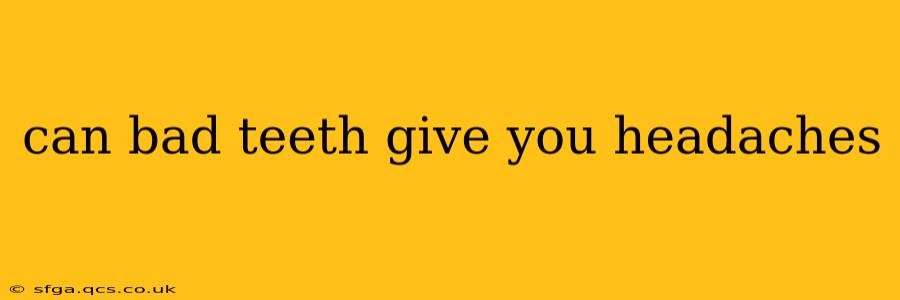Can Bad Teeth Give You Headaches? A Comprehensive Look at Temporomandibular Joint (TMJ) Disorders and Oral Health
The connection between bad teeth and headaches might surprise some, but the answer is a resounding yes, in many cases. While not every headache stems from dental problems, a significant number are linked to issues in the temporomandibular joint (TMJ), the jaw joint connecting your jawbone to your skull. Problems in this area, often stemming from dental issues, can lead to significant pain, including headaches. Let's delve deeper into this complex relationship.
What is the Temporomandibular Joint (TMJ)?
The TMJ is a crucial joint facilitating chewing, talking, and yawning. It's a complex structure, susceptible to dysfunction and pain. Conditions affecting the TMJ are broadly termed Temporomandibular Joint Disorders (TMJDs). These disorders can manifest in various ways, including headaches.
How Can Bad Teeth Lead to Headaches?
Several ways bad teeth can contribute to headaches related to TMJ disorders include:
- Malocclusion (Bad Bite): An improper bite, where your upper and lower teeth don't align correctly, puts extra strain on the TMJ. This misalignment forces the jaw to work harder, leading to muscle tension and pain radiating to the head as headaches.
- Grinding and Clenching (Bruxism): Teeth grinding (bruxism) and clenching, often subconscious behaviors, put immense pressure on the TMJ. This constant pressure can cause inflammation, pain, and headaches. Stress and anxiety are often contributing factors to bruxism.
- Missing Teeth: The absence of teeth can affect the bite and jaw alignment, potentially contributing to TMJ dysfunction and headaches. The remaining teeth might shift to compensate, leading to an uneven bite and TMJ strain.
- Damaged Teeth: Severe tooth decay, gum disease, or poorly placed dental restorations (fillings, crowns) can disrupt the proper function of the jaw joint and create imbalances leading to pain and headaches.
- Infections: Severe infections in the teeth or gums can spread, affecting the TMJ and causing inflammation that may manifest as headaches.
What Types of Headaches Are Linked to Dental Problems?
Headaches associated with TMJ disorders often present as:
- Tension Headaches: These are the most common type, characterized by a dull, aching pain around the head and neck. TMJ dysfunction frequently contributes to tension headaches due to the muscle tension in the jaw and surrounding areas.
- Migraines: While the exact cause of migraines remains unclear, TMJ disorders can be a significant trigger or aggravating factor for some individuals. The pain and muscle tension associated with TMJ dysfunction can exacerbate migraine symptoms.
- Facial Pain: Pain is not always limited to the head. TMJ disorders can cause pain in the jaw, face, and even ears.
How Can I Tell if My Headache is Related to My Teeth?
Determining the cause of headaches can be challenging, requiring a proper diagnosis. However, several clues might suggest a dental connection:
- Jaw Pain or Stiffness: Pain or discomfort in the jaw, especially when chewing or opening your mouth wide, is a strong indicator.
- Clicking or Popping Sounds in Your Jaw: These sounds often accompany TMJ dysfunction.
- Earache: Pain in the ear can be a symptom of TMJ problems.
- Headache Worsening with Chewing: If your headache intensifies while eating, it might be linked to your jaw and teeth.
What Should I Do if I Suspect My Teeth Are Causing My Headaches?
If you suspect a link between your teeth and headaches, consulting a dentist and possibly a temporomandibular joint specialist (orthodontist or maxillofacial surgeon) is crucial. They can conduct a thorough examination to identify the underlying cause and recommend appropriate treatment. Treatment options may include:
- Mouthguards: These custom-made devices can protect teeth from grinding and clenching, reducing strain on the TMJ.
- Physical Therapy: Exercises and therapies can help strengthen the jaw muscles and improve TMJ function.
- Medications: Pain relievers, muscle relaxants, and other medications may be prescribed to manage pain and inflammation.
- Dental Procedures: Addressing any underlying dental problems such as misalignment, missing teeth, or infections is essential.
Remember, this information is for educational purposes and not a substitute for professional medical advice. Always seek the guidance of a qualified healthcare professional for diagnosis and treatment.
